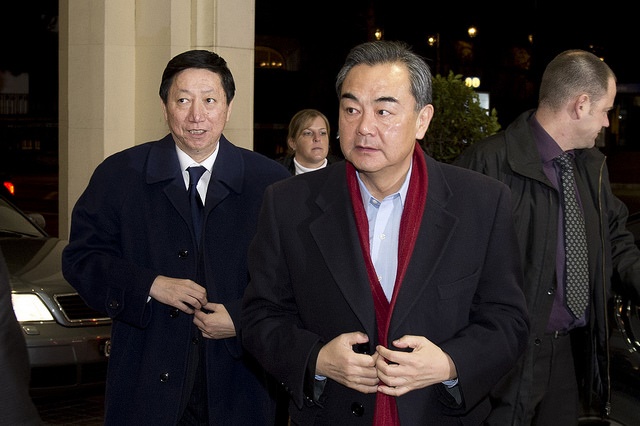China's Strategic Gambit: Expert-Led US Deal Negotiation

Table of Contents
The Composition of China's Negotiation Teams
China's success in international trade negotiations, particularly those involving the US, stems significantly from the composition of its negotiating teams. These are not merely collections of diplomats; they are carefully assembled groups of experts representing a wide range of disciplines. The expertise within these teams forms a powerful synergy, enabling China to approach negotiations with a comprehensive understanding of the issues at hand.
- Experienced negotiators with deep understanding of international trade law: These individuals possess intricate knowledge of WTO rules, trade agreements, and dispute resolution mechanisms. Their understanding of legal precedents and international norms provides a solid foundation for China's negotiating position.
- Economists specializing in macro and microeconomic impacts of trade agreements: These experts analyze the potential economic consequences of different trade deals, forecasting the impact on various sectors and advising the negotiating team on strategies to maximize economic benefits for China.
- Technical experts familiar with specific industry regulations and standards: Detailed knowledge of specific industries and their regulatory frameworks is crucial. This allows China to address technical barriers to trade effectively and leverage its expertise to gain a competitive advantage.
- High-ranking government officials with political influence: The inclusion of high-level officials adds a significant element of political weight to the negotiations. Their presence signifies the importance China places on the outcome and strengthens its bargaining power.
The hierarchical structure within these teams is equally important. Decision-making processes are often tightly controlled, ensuring a unified and consistent approach to negotiations. This prevents internal disagreements from undermining China's position.
Key Negotiation Tactics Employed by China
China's negotiation tactics are characterized by a blend of strategic patience, calculated brinkmanship, and the effective leveraging of its massive domestic market. These tactics often go beyond the traditional give-and-take of negotiations, reflecting a long-term strategic vision.
- Strategic use of concessions and compromises to achieve long-term goals: China often employs a strategy of making seemingly small concessions in the short term to achieve larger, strategically important gains in the long run. This requires patience and a clear understanding of their ultimate objectives.
- Masterful deployment of public relations to shape international perception: China uses public statements, media appearances, and carefully crafted narratives to influence public opinion both domestically and internationally. This can pressure the opposing side and create a more favorable negotiating environment.
- Leveraging its vast domestic market as a bargaining chip: China's enormous domestic market is a powerful bargaining tool. The potential loss of access to this market can be a significant incentive for the other party to compromise.
- Employing delay tactics to wear down opponents: Prolonging negotiations can sometimes be a strategic advantage, allowing China to wear down its opponents and potentially extract more favorable terms.
Understanding China's Long-Term Strategic Goals
China's approach to China US Deal Negotiation is inextricably linked to its broader geopolitical and economic ambitions. These long-term goals shape its negotiating strategies and influence the concessions it is willing to make (or not make).
- Securing access to key technologies and intellectual property: China's ambition to become a global technological leader drives its pursuit of access to advanced technologies and intellectual property. This objective often plays a significant role in trade negotiations.
- Strengthening its position in global value chains: China aims to move beyond its role as a manufacturer of low-cost goods and establish itself as a key player in higher-value segments of global value chains. This ambition is reflected in its negotiating positions on trade and investment.
- Promoting its economic model as an alternative to Western capitalism: China's economic success has led it to promote its model as a viable alternative to Western capitalism, and this ambition is reflected in its engagement in international trade negotiations and economic forums.
- Expanding its influence in international organizations: China seeks to increase its influence in global governance structures, such as the WTO, reflecting its growing economic and political power.
The Impact of Expert-Led Negotiations on US-China Relations
The expert-led nature of China's negotiation teams has significantly impacted US-China relations, leading to both successes and failures in past agreements.
- Increased complexity of negotiations due to expertise on both sides: The high level of expertise on both sides increases the complexity of negotiations, requiring sophisticated strategies and a deep understanding of the multifaceted issues involved.
- Potential for both cooperation and conflict depending on the specific issues: The outcome of these negotiations varies depending on the specific issues being discussed. While some areas may lend themselves to cooperation, others could be sources of significant conflict.
- The need for the US to adopt similarly sophisticated negotiation strategies: To effectively compete with China, the US needs to adopt equally sophisticated and expert-driven negotiation strategies, matching the level of preparation and understanding exhibited by its counterpart.
- The long-term impact on global trade and economic stability: The outcomes of these negotiations have long-term implications for global trade patterns, economic stability, and the overall international economic order.
Conclusion
This article examined China's strategic approach to China US Deal Negotiation, highlighting the crucial role played by expert-led teams. Their expertise, combined with sophisticated negotiation tactics and clear long-term strategic goals, significantly impacts the outcome of these negotiations and broader US-China relations. The analysis revealed a need for a deeper understanding of China's strategic objectives to facilitate more effective future negotiations.
Understanding the intricacies of China US Deal Negotiation is crucial for navigating the complexities of the current global economic landscape. Stay informed about the latest developments in this critical area by following further research and analysis on this subject. Continue your exploration of China-US trade negotiations to gain a competitive advantage in the evolving global marketplace.

Featured Posts
-
 Limited Time Offer Boston Celtics Finals Gear Under 20
May 16, 2025
Limited Time Offer Boston Celtics Finals Gear Under 20
May 16, 2025 -
 Nba Playoffs Cavaliers Vs Celtics Game Prediction And Analysis
May 16, 2025
Nba Playoffs Cavaliers Vs Celtics Game Prediction And Analysis
May 16, 2025 -
 Kucherov I Tampa Bey Triumf Nad Floridoy V N Kh L
May 16, 2025
Kucherov I Tampa Bey Triumf Nad Floridoy V N Kh L
May 16, 2025 -
 Everton Vina Coquimbo Unido 0 0 Resultado Resumen Y Mejores Momentos
May 16, 2025
Everton Vina Coquimbo Unido 0 0 Resultado Resumen Y Mejores Momentos
May 16, 2025 -
 Amber Heards Twins The Elon Musk Connection And Embryo Dispute Fallout
May 16, 2025
Amber Heards Twins The Elon Musk Connection And Embryo Dispute Fallout
May 16, 2025
